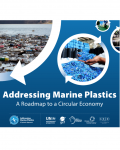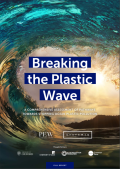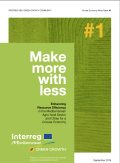This paper seeks to provide guidance and recommendations for policymakers to increase ambition in Nationally Determined Contributions (NDCs) under the Paris Agreement using the climate change mitigation and adaptation potential of a transition to sustainable food systems.

This publication identifies actions to reduce plastics leakage, with guidance on the stakeholders involved and the timescales. It aims to improve the circularity of the plastics value chain, along with minimising leakage, especially into marine environments.

This report introduces a new model designed to quantify key plastic flows and stocks in the global plastic system, estimate the quantity of ocean plastic pollution expected under six scenarios between 2016 and 2040, and assess the economic, environmental, and social impacts of the principal known solutions and technologies.

The first of four Thematic Working Groups created by the Interreg MED's Green Growth community focused on Sustainable Consumption and Production by enhancing Resource Efficiency in the Mediterranean agrofood sector as well as in urban areas through the implementation of the Smart City Concept.
This White Paper zooms in on the difficulties that companies face in:
- Measuring their environmental footprint and resource efficiency;
- The use of low-cost, low-tech, labour-intensive, and rudimentarily-equipped greenhouses;
- The lack of energy efficiency and renovation of EU buildings.
It then presents the projects' solutions and the benefits of resource efficiency for the environment and the economy. The projects were monitored according to the EU CEAP's indicator framework.
Single-use plastic bags (SUPBs) are one of the most consumed items globally and much debate has evolved around their environmental impact. To identify which solution is environmentally more sustainable, the impact of SUPBs compared to their alternatives needs to be investigated under a life cycle perspective.
